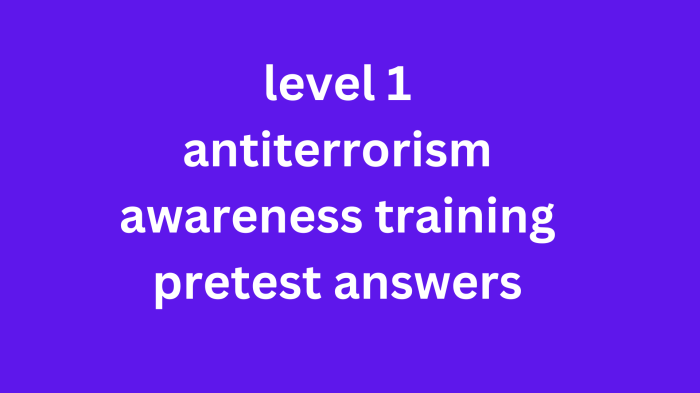Unveiling the Level I Antiterrorism Awareness Training Post Test Answers: A Comprehensive Guide, this discourse delves into the intricacies of counterterrorism preparedness, empowering individuals with the knowledge and understanding to navigate the ever-evolving threat landscape.
The subsequent paragraphs provide an in-depth exploration of the test’s structure, key concepts, assessment strategies, and practical applications. Additionally, best practices and areas for improvement are examined to enhance the effectiveness of antiterrorism awareness training programs.
Level I Antiterrorism Awareness Training Post Test Format
The Level I Antiterrorism Awareness Training Post Test is a standardized assessment that evaluates participants’ understanding of fundamental antiterrorism concepts and their ability to apply them in real-world situations.
The test consists of multiple-choice questions, true/false questions, and short answer questions. Participants are given a time limit to complete the test, and their responses are graded based on a predetermined scoring system.
Question Types
- Multiple-choice questions present participants with a list of possible answers and require them to select the correct one.
- True/false questions require participants to indicate whether a statement is true or false.
- Short answer questions require participants to provide a brief written response to a question.
Time Limit and Grading System
The time limit for the test varies depending on the specific training program. The grading system is also predetermined and may vary from program to program.
Key Concepts Covered in the Training: Level I Antiterrorism Awareness Training Post Test Answers

The Level I Antiterrorism Awareness Training covers a range of key concepts, including:
Fundamental Principles of Antiterrorism Awareness
- Understanding the nature and scope of terrorism
- Recognizing the different types of terrorist threats
- Identifying potential targets of terrorism
Roles and Responsibilities of Individuals in Preventing Terrorism, Level i antiterrorism awareness training post test answers
- Reporting suspicious activity
- Cooperating with law enforcement
- Educating others about terrorism
Assessment of Knowledge and Understanding
The Level I Antiterrorism Awareness Training Post Test is a comprehensive assessment of participants’ knowledge and understanding of the training material.
The test questions cover a wide range of topics, including the nature of terrorism, the different types of terrorist threats, and the roles and responsibilities of individuals in preventing terrorism.
Participants who score well on the test demonstrate a strong understanding of the fundamental principles of antiterrorism awareness and are well-prepared to apply these principles in real-world situations.
Application of Training Principles

The principles learned in the Level I Antiterrorism Awareness Training can be applied in a variety of real-world situations.
For example, participants can use their knowledge of the different types of terrorist threats to identify potential targets and take steps to protect themselves and others.
They can also use their understanding of the roles and responsibilities of individuals in preventing terrorism to report suspicious activity and cooperate with law enforcement.
Continuous Improvement and Best Practices
The Level I Antiterrorism Awareness Training program is continually being improved to ensure that it remains effective and up-to-date.
Best practices for conducting antiterrorism awareness training include:
- Using a variety of teaching methods to engage participants
- Providing participants with opportunities to practice applying the training principles
- Evaluating the effectiveness of the training program and making necessary adjustments
FAQ Insights
What is the format of the Level I Antiterrorism Awareness Training Post Test?
The post test typically consists of multiple-choice questions that assess understanding of key antiterrorism concepts, threats, and prevention strategies.
How much time is allotted for the post test?
The time limit for the post test varies depending on the specific training program, but it typically ranges from 30 to 60 minutes.
What is the passing score for the post test?
The passing score for the post test is usually set by the training provider and may vary depending on the organization’s standards.
What are some tips for preparing for the post test?
To prepare for the post test, it is recommended to thoroughly review the training materials, focus on understanding key concepts, and practice answering sample questions.